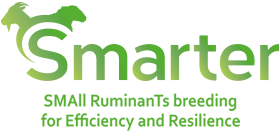
This project has received funding from the European Union’s Horizon 2020 research and innovation programme under grant agreement No 772787.
REA 2nd Review Meeting Outcome
– by R. Rupp and R. Bica
The second review meeting with REA was held on the 28/01/22. The meeting was moderated by Francisca Cuesta-Sanchez of the European Commission, and the two reviewers were Luca Fontanesi and Ismo Stranden.
The review started off with a brief introduction of the project and recap of what was done in RP1 and in the most recent RP2. This was done by Project Coordinator Rachel Rupp and was then followed by 20-minute presentations from each Work Package (WP) leader, detailing what has been done in their individual work packages, what is still to be done and the achieved milestones/deliverables.
Regarding the ongoing sanitary crisis and how that was assessed in the meeting, there were several WP’s that were affected more than others due to the nature of the work undertaken (more practical vs more computer based). This was mainly observed in WP’s 1 and 2 in which much of the practical work had to be postponed, however with the approved extension of the project deadline to June 2023 everything is still set to be completed on time.
Overall, the meeting was a success, with positive feedback both by Francisca Cuesta-Sanchez and the two reviewers. The main discussion points of the review were the following:
- Every WP needs to ensure that what they are doing is in line with the original submitted DOA, as some inconsistences were noted, and deviation from the original plan may need to be carefully explained.
- For WP1 and WP2, reviewers highlighted the high number of phenotypes, the diversity of datasets and experiments with low numbers at times. They raised the possibility of focusing more specifically on a few key selected phenotypes/populations.
- More and improved cooperation between and within WP’s has been requested to ensure that we are all working together to achieve a common goal.
- Practical WP’s need to ensure that their original suggested objectives are still achievable under the current conditions, and whether it is worth altering their schedule. As the reviewers pointed out that this may be necessary to ensure the completion of the project by June 2023.
- Each new change made should always keep in mind the final objective of the SMARTER project to ensure that, especially for the upcoming RP3, the approval of the changes by the European Commission is a straight forward and quick process.
The priority now will be to work on the amendments requested from RP2, which will feed into the completion of RP3, which is scheduled for September 2022.

Eghoria goats – © AUTH

Boutsko sheeps – © AUTH

